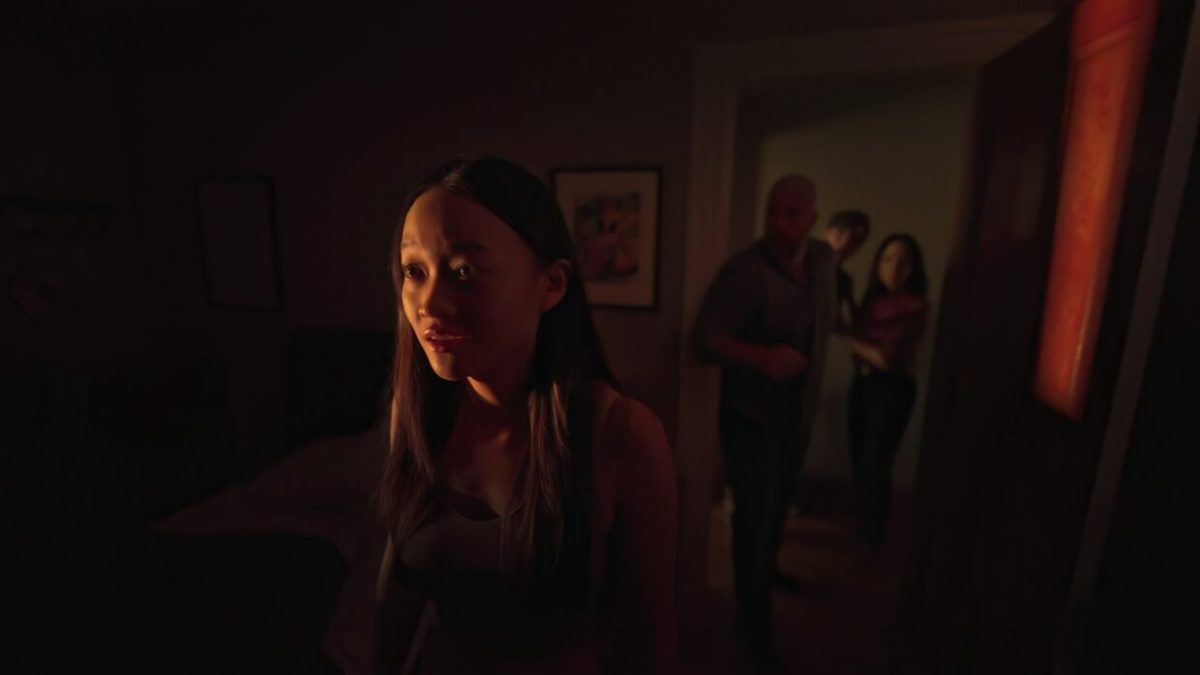
“The Boys in the Basement Were Very Active On This One”: Screenwriter David Koepp on Writing Steven Soderbergh’s Ghost POV Thriller Presence
Jan 22, 2025
Callina Lianag as Chloe in Presence (Photo: Peter Andrews)
Updating the themes of The Conversation and Blow Out for the pandemic era, 2022’s Kimi, Steven Soderbergh’s thriller about the panoptic world of voice assistants, marked the director’s first realized collaboration with veteran screenwriter David Koepp, whose filmography is noteworthy for his many scripts written for legendary auteur directors, including Brian DePalma (Carlito’s Way, Snake Eyes, Mission Impossible), Steven Spielberg (Jurassic Park, The Paper), and David Fincher (Panic Room). And that’s in addition to his direction of his own scripts, including Stir of Echoes and Ghost Town. Now, with another fleet, multi-layered thriller, Presence, Koepp continues his collaboration with Soderbergh, accepting this time a brief that’s far away from the often VFX-heavy projects he’s most associated with. Presence is a ghost story defined by a single formal concept: the whole movie is from the point-of-view of the ghost — a POV captured by the director/cinematographer himself.
Of course, simple concepts, well executed, belie skillful understanding of narrative economy, which Koepp’s screenplay provides. Along with its deft twists on ghost movie tropes, Presence is a wrenching family drama, one in which that mysterious supernatural force unravels for the viewer the frayed emotional dynamics that make up this very modern family. Rebekah, the mother (Lucy Liu), secretly engages in probable online financial crimes while doting on her son (Eddie Maday) and virtually ignoring the emotional health of her daughter, Chloe (Callina Liang). Chris, the father (Chris Sullivan), meanwhile tries to be the responsible parent to both children even as he contemplates breaking up with the walled-off Rebekah. The ghost, its jittery movements tracking its own anxiety, reacts with alarm to the unfolding family saga, and the reasons for that distress provide the film with its final gut-punch reveal.
Over Zoom I spoke to Koepp about writing within the confines of the film’s single point-of-view, the value of what’s left out of a story, dreams and screenwriting, and his thoughts on the business of screenwriting today. Presence opens January 24, 2025 from NEON.
Filmmaker: Steven has discussed a true life possible ghost story occurring in his own house, and I understand that he brought that idea to you. Was the idea that there would be this first-person camera from the ghost’s POV baked in from the beginning?
Koepp: Yes. He said, “I want do a ghost story, all first person, point of view of the ghost.” And then he said, “All in one house, the family.” “I’m in,” I said. I love a confined space thriller, and I love an aesthetic challenge, like only seeing what the ghost sees. And I like smuggling a family drama into a spooky movie. [Steven asked], “And can the family be messed up?” And I said, “Oh, well, yeah, we’re not gonna make it about how well it’s all going.” He had written eight or 10 pages, and they were exactly what he meant, and I just ran from there.
Filmmaker: Were those pages a treatment or actual scenes?
Koepp: They were in script form because I think he wanted to see how you would write [a script] in just one point of view. The first few pages were very much like what we see in the film. You’re in a house looking around, hiding in this closet a lot, and a realtor shows up to show the house. Then painters [arrive], and one them won’t go into the [bedroom], and then I just kind of ran from there.
Filmmaker: Tell me about the specific challenges of writing a character who is only expressed through camera movement and not dialogue.
Koepp: Well, you decide what is this character like? Skittish. Nervous. Frightened and confused, but also very curious. So that in itself tells you a lot about how to write the scenes and where the presence goes. It moves forward because it wants to listen to people, and if it’s something it doesn’t like, it retreats, and the closet is the safe space. And if it’s agitated, it moves around a lot.
Filmmaker: This character is one played by Steven Soderbergh, basically, with a camera strapped to his chest.
Koepp: Right: So what the conceit does is say, “Don’t write scenes that can’t be shot as oners because the ghost doesn’t cut.” I mean, the little fades to black take us to different things, but intercutting, forget it. But again, I like that kind of challenge because in a suspenseful or scary story, you’re always intercutting. That’s one of the biggest tools in your box, but you couldn’t use it on this [film].
Filmmaker: How big of an adjustment was that for you?
Koepp: Well, once you accept it, it’s fine. Steven also said, by the way, “Keep it short. I think it’ll work, but I think we’ll get tired of the conceit if we make them sit through two hours of it.” So it’s a very snazzy 83 minutes, and I think it really works at that length.
Filmmaker: In our interview with Steven by Amy Taubin, he talks about being quite shocked at reading a climactic scene in the third act that she likened to the movie Peeping Tom. What’s your process working with Steven in terms of scenes like that? Are you revealing plot beats as you along, or are you hoping to surprise him? That scene in particular, did he know it would be there?
Koepp: For this and for Kimi, which we did a few years ago, I usually write a sort of treatment for myself. It’s just me telling the story in 15 or 20 pages of prose, and it’s not very nice prose. [The story] is just sort of tumbling out, and I give him that, and he’ll have a couple comments on it — sometimes bigger [comments] and sometimes smaller. But not a lot [of comments] because Steven oesn’t really micromanage anyone, really. I think that’s why he does so many jobs on a movie — he might as well just do it himself if he’s gonna do that.
Filmmaker: At the same time, he’s not writing and you are.
Koepp: Yes, he very much lets me write, which I appreciate a lot. So then I turn it in. But I don’t know why it turned out so sick at the end. I’m a very nice guy. I think it’s that when you write this kind of movie, you’re writing about your own fears. I have four kids, and I find the experience of shepherding children through their teenage years harrowing. And so you’re just writing about what frightens you.
Filmmaker: The 15 or 20-page prose treatment, is that something you’ve done all along? Is it part of your normal practice?
Koepp: It kind of evolved over time. I’ve always done scene cards since I started writing scripts. I still love them, it’s just a great way to think — 3”x5” cards that you put out on a coffee table and look at and see where things go and how it flows. Ten or 15 years ago, I started writing these [prose treatments], because you should put together stories quickly, I think, in two or three days. And then of course, revise them until the day you die. But I feel like it sort of has to happen all at once, so a slightly stream of consciousness summary of the story is super helpful to me. I don’t get too much into the specifics, because that takes all the joy out of writing.
Filmmaker: My first job in film was reading scripts for New Line Cinema in the early ‘90s. Back then we all read the Syd Field book [Screenplay], and the executives were taking the Robert McKee class, which I kind of poo-pooed. And then when McKee’s book [Story] came out, I read it and thought, “Okay, there’s some stuff in here, maybe.”
Koepp: “There’s some stuff in here, maybe,” is the exact right response to any writing book.
Filmmaker: But I’ve been very surprised how many young writers today just download Save the Cat beat sheets.
Koepp: And they probably use a Google form to structure their five-paragraph essay for school. Don’t do that. I’m not an adherent to that. I think the more you can write down the better. Hold on.
Koepp steps away from the Zoom and returns with a stack of index cards.
This is the thing I’m working on now, and here are my little scene cards. This one started with characters. [Koepp holds up several pages with filled with character descriptions.] It’s called Yard Work, by the way, and it’s from an Audible story I wrote a couple of years ago. Any writing you do forces you to think — inspiration occurs during composition. So when you’re writing about Chloe [in Presence], and you’re forced to type, your mind is thinking of her traits. She has a lot of anxiety. Is she mad at her father? So, to young writers, don’t just start writing. Even if you have 3”x5” cards, don’t just start writing. It’ll be a disaster. You’ll get 20 pages and quit. Everybody’s got 20 pages of a screenplay in them. But where it gets ugly is from page 30 to 85. That’s where the rubber really hits the road.
The next step is an outline, which I write up. Then you can start writing. Writing the scenes is the reward you get for all the prep you’ve done, and it’s fun because you get to write a big fat check mark on them after you write them. It’s like going to trial. You better have done all your prep work and know what you’re talking about. And then go in and let the surprises happen.
Filmmaker: With that level of pre-planning, what are the surprises that happen?
Koepp: The structure changes. You’re on page seven, you’re about to write the scene you’d planned at the hardware store, and you realize, “Well, I kind of covered that with a line.” So now that [scene] goes and then, “Oh, I could move this whole chunk up here.” The best writing day ever is when a character refuses to do something that’s in the outline. You have them go apologize to their ex, you start to write and you realize, “he’s never going to do that. “So he never apologizes. Then [the story] changes, and you go back to your cards and shuffle them around and think about what would really happen, but you have room for that if you have choreographed [the rest]. You can improvise moves, but not unless you have a plan. “No plan” is what makes scripts die.
Creating a family — what their dramas, resentments and secrets were — that was what was fun. I wanted there to be more secrets than we discover. Like Lucy’s character, we know she’s up to some financial shenanigans, but we never quite know what. I know the answer, but because I was restricted [in terms of exposition to] what the presence can overhear, that’s how much [the audience] knows. The presence can’t speak and say [to the mother], “Hey, what did it mean when you said blah blah blah?” But we get a vague idea. It’s all about what’s left out.
Filmmaker: In writing this were there ghost stories that you thought about either in literature or in film?
Koepp: You always want to look around and see what the literature is. I thought about ghost stories a lot in the past because I made Stir of Echoes and then Ghost Town, which was a comedy. So I’m conversant in the ghost story canon. But I guess if I thought of one for this movie, it would probably be Rosemary’s Baby, which is like my favorite movie because it’s [about] secrets within the intimacy of a family structure, or a marriage, and in a place. And it has such an overwhelming sense of mood and reality.
Filmmaker: It’s also a film doesn’t lean heavily into the shadows and darkness tropes, which your film doesn’t really as well. There’s a closet, but still the rooms are ones from a nice, upper middle-class/upper-class suburban home.
Koepp: You always look for setting. Setting is important in all films, but in ghost stories in particular. On Stir of Echoes, I very consciously wanted that to be working class Chicago, which has got a distinctive feel. The setting for Ghost Town is Manhattan in autumnal paradise because it’s a comedy. This felt like a different way to go, and it was also very helpful that it was usually raining. Steven shot this during a very rainy period, and it just happened that it was unusually gloomy, so that worked.
Filmmaker: In Kimi, you dealt with voice assistants and surveillance. And in this film, even though you say the details of Lucy’s financial manipulations are not clear, you still understand that for her there’s an attempt to gain wealth by gaming the system.
Koepp: There are moral failings here, particularly Lucy’s character. She’s always gaming something. She wants to move to this [neighborhood] so her kid can get on the better [school] district where he can dominate the swim team, which will help us secure his future. She’s moving money around in ways that are not at all legal and not talking to her husband about it. [Lucy] does some wonderfully subtle work in the scene where she’s on the laptop deleting emails frantically when [her husband] comes into the room. Notice the laptop moves. He never quite sees her screen because she’s always shifting around, making it look like she’s just getting more comfortable but, in fact, she’s keeping him the hell away from it. So, morally, she is a bit suspect.
Filmmaker: That’s another thing the film does really well, which is dramatize the kind of silence, or distance, between two partners who are living in close proximity. They obviously both have rich internal lives. The father has a level of guilt about not protecting his kids enough. And he’s self aware of the toxic elements of his marriage.
Koepp: He’s thinking about getting out [of the marriage], and I find that character, and Chris’s performance of it, really heartbreaking. He’s trying to connect with his daughter, certainly. He’s not even bothering with his son anymore. At one point, he very candidly talks to Lucy’s character and says, “Look, I thought about getting out, but I’m not going to. I’ll go through this with you if you want, but you’ve got to tell me [what’s going on].” I found that touching.
Filmmaker: In this film, were their moments when the characters didn’t do you want you outlined them to do, as you suggested earlier?
Koepp: Let’s see, were my characters all obedient? Yeah, everybody kind of did what I said. (laughing) But it also just tumbled out very quickly. It wasn’t overly schematized in advance. For some reason, I would have bad dreams while I was writing this movie. I can’t imagine why. When I was [writing] the first draft, I’d wake up at like 5:00 AM every morning with the movie in my head. Most of this movie was written between 5:00 AM and 7:00 AM before the rest of the house was awake. I was just alone with it. I can’t say I was super happy while I was writing it because it’s a very dark thing, but it did sort of tumble out very coherently.
Filmmaker: What kind of dreams, if you don’t mind me asking?
Koepp: I do mind you asking.
Filmmaker: Okay. I guess I’m just interested in how the unconscious can figure in screenwriting.
Koepp: Well, Stephen King calls them the boys in the basement. He says, when you’re working on something, particularly an early draft, don’t worry if your days are short because rest assured that when you leave and when you’re shopping and cooking and when you’re sleeping, the boys in the basement are working on it. And I would say the boys in the basement were very active on this one because so much of it’s about fear. And, you know, your unconscious is full of fear.
Filmmaker: The business of being a professional screenwriter has changed so much since when you started. If you were starting out today, can you imagine what path you’d take?
Koepp: That’s very hard to say because I don’t know what my influences would have been. I saw Jaws and Star Wars when I was 13 and 14 years old. And then the next ten years of my life were Close Encounters, Raiders, E.T. —
Filmmaker: Spielberg.
Koepp: It’s not surprising that I gravitated towards those kinds of movies. But also Altered States and Alien — that great period from ’77 to ’80. So those were my influences, and movies were what I cared about. I had no interest in television. Television was M*A*S*H and sitcoms. So, it was all about movies, and it still is. I don’t understand TV. I’ve tried putting together a show once or twice. It doesn’t work. I like to watch it sometimes. I’d still always rather watch a movie than a TV show. And so that’s all I think about. Is there anybody coming up now who thinks that way? I don’t know. I don’t know how you can be 25 years old and not consider episodic TV as part of the cultural stew from which you emerged.
Filmmaker: Does the spec script still hold the same value?
Koepp: Yeah, but unfortunately not just by itself and not like it used to. And that I really lament if you want to down the “things aren’t like they used to be” road. When I came up, you’d sell a script to a studio. There would be an executive who cared about it because they bought it, so it’s their job. You do a couple of rewrites to get it solid. They help you find a director. They help you find cast. They’re involved in the process. And now – and in part it’s the fault of talent and in part it’s the fault of the buyers — they want you to come with a script, a star director and two movie stars. Not one but two. And because those packages come in with popular people attached, there is a schedule window. “This has to go in August because we’re gonna lose Steven and Julia,” and so on and so on, you know? It has to go in August, and it’s March now, so the script, which was probably only a first or second draft, has a certain amount of time, but not that much, to go through some paces. Nobody ground [down] that poor writer and made him do 10 drafts, which, I have to admit, is good for you. Especially if you can fight and don’t get fired. But if you are forced to defend why the script is the way it is, you keep improving it all the time. That process of development I miss.
Filmmaker: Were there scripts you’ve worked on that particularly benefited from that process? Or, the opposite, got worse?
Koepp: Spielberg is shooting the script I’m doing now in February, and he has been relentless for a year, but it’s better every time. So, I take my hat off. Carlito’s Way went through so many drafts. We rehearsed every weekend during shooting and rewrote — it was a lot, but it’s a beautiful movie.
Filmmaker: Was that development focus coming from DePalma or the executives?
Koepp: First it was the producer, Marty Bregman. We did a lot of drafts. Then Brian came in, and we did a lot of drafts. And then it was Mr. Pacino, who is rather demanding. He was playing a gangster, and he was like, “I can’t get it wrong. I can’t blow it.” So that motivated a lot of extra scrutiny.
Filmmaker: Was Pacino bringing in his own sort of research and ideas that you then had to incorporate into what you had written?
Koepp: No, not really, it was more a lot of questioning and prodding. And that stuff’s important. Sean Penn had questions and did prodding of his own. There were some personalities on that movie.
Filmmaker: Is that a process you engage with a lot — writing or being around the set during the production?
Koepp: I used to go to the set all the time. It’s exciting and fun, and then I realized it isn’t. Sometimes actors see me coming and they think “rewrites!” when rewrites aren’t needed. Most of the time I’m really bored. I’ve been on this movie a couple of years, I’ve written it, and now they’re shooting it. I have other ideas, and I’d like to go home and work on them, please. So I really don’t go unless I’m needed.
Filmmaker: Finally, I want to ask you about the identify of the ghost. It seemed clear to me by the end of the movie, but most people I’ve spoken to seem to not get it. The ghost is —
Here, Koepp and I discuss the identify of the ghost and the various clues seeded in the screenplay, a conversation I will redact so as to avoid spoilers.
Filmmaker: Have other people asked you about the identity of the ghost?
Koepp: Yes. I think Steven is more comfortable with ambiguity than I am. He likes it. [He thinks], “Good, something from them to talk about.” I’m like, “Don’t you want to loop in a line [where we clearly explain it]?” And he said, “No, I really would rather not.”
Publisher: Source link
Jessica Alba Confirms Cash Warren Split
Jessica Alba Confirms Cash Warren Split After more than 16 years of marriage and weeks of rumors that a separation had taken place, Jessica confirmed the news in an Instagram post accompanied by a statement. "I've been on a journey…
Jan 23, 2025
Scarlett Johansson, Colin Jost Give Glimpse Into Marriage in TV Debate
Scarlett Johansson and Colin Jost’s Parenting Debate Gives Rare Glimpse Into Their MarriageLive from New York, it's...Colin Jost! The Saturday Night Live comic surprised Scarlett Johannson during her stint as Jenna Bush Hager's guest cohost for the Today show's fourth hour…
Jan 23, 2025
Timothée Chalamet Hinted At His Smelliest Costar
Timothée Chalamet Hinted At His Smelliest Costar After pulling up to the London premiere on a Lime bike (and getting fined for it), Timmy and his costar, Edward Norton, stopped off at BBC Radio 1 this week, where they played…
Jan 22, 2025
Addison Rae Addresses Rumors Ex Bryce Hall Cheated on Her
Addison Rae is digging up the grave just one last time. The “Diet Pepsi” singer—who has been dating guitarist Omer Fedi since 2021—recently reflected on her past relationship with fellow TikTok phenom Bryce Hall and what she learned from their…
Jan 22, 2025











